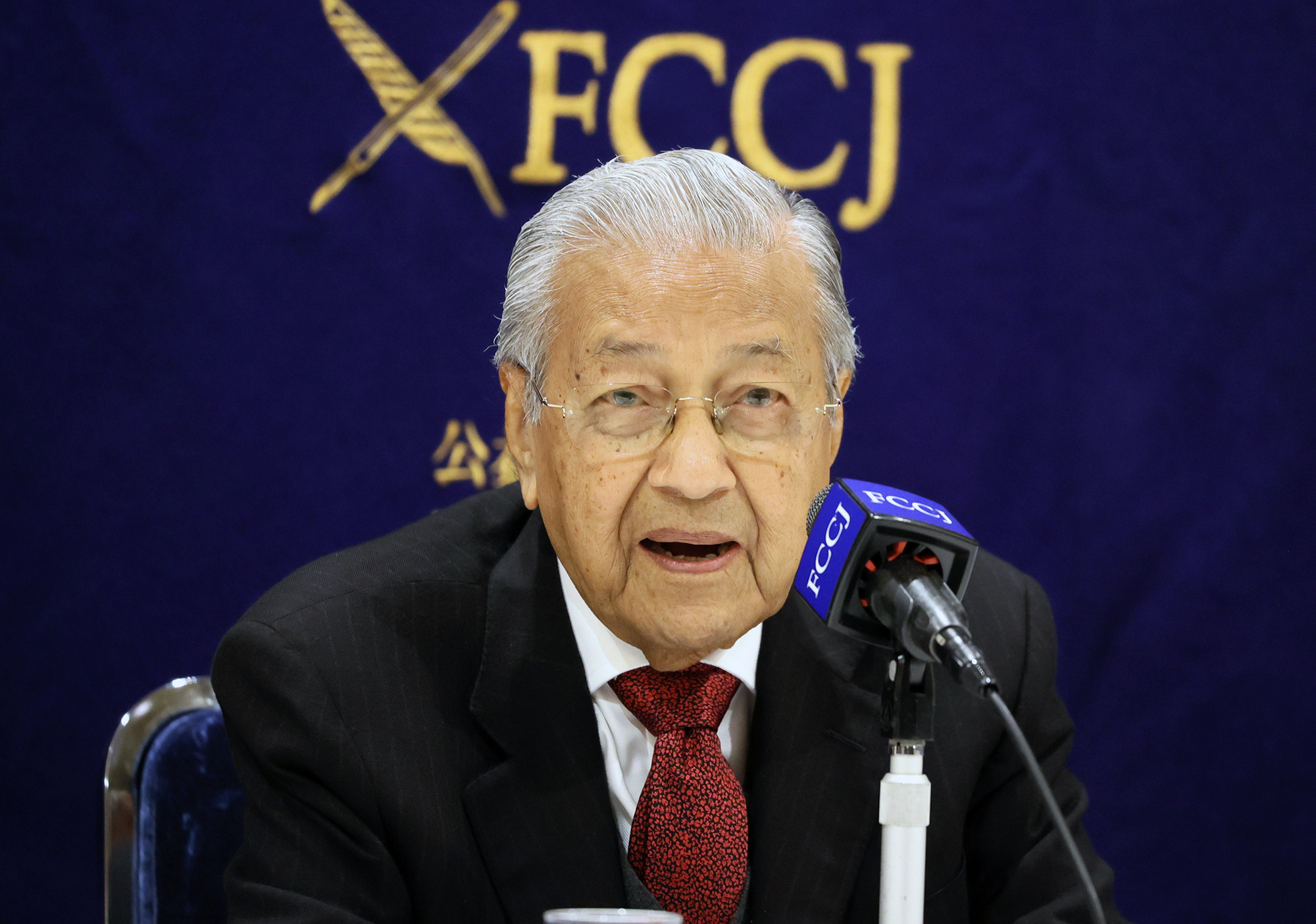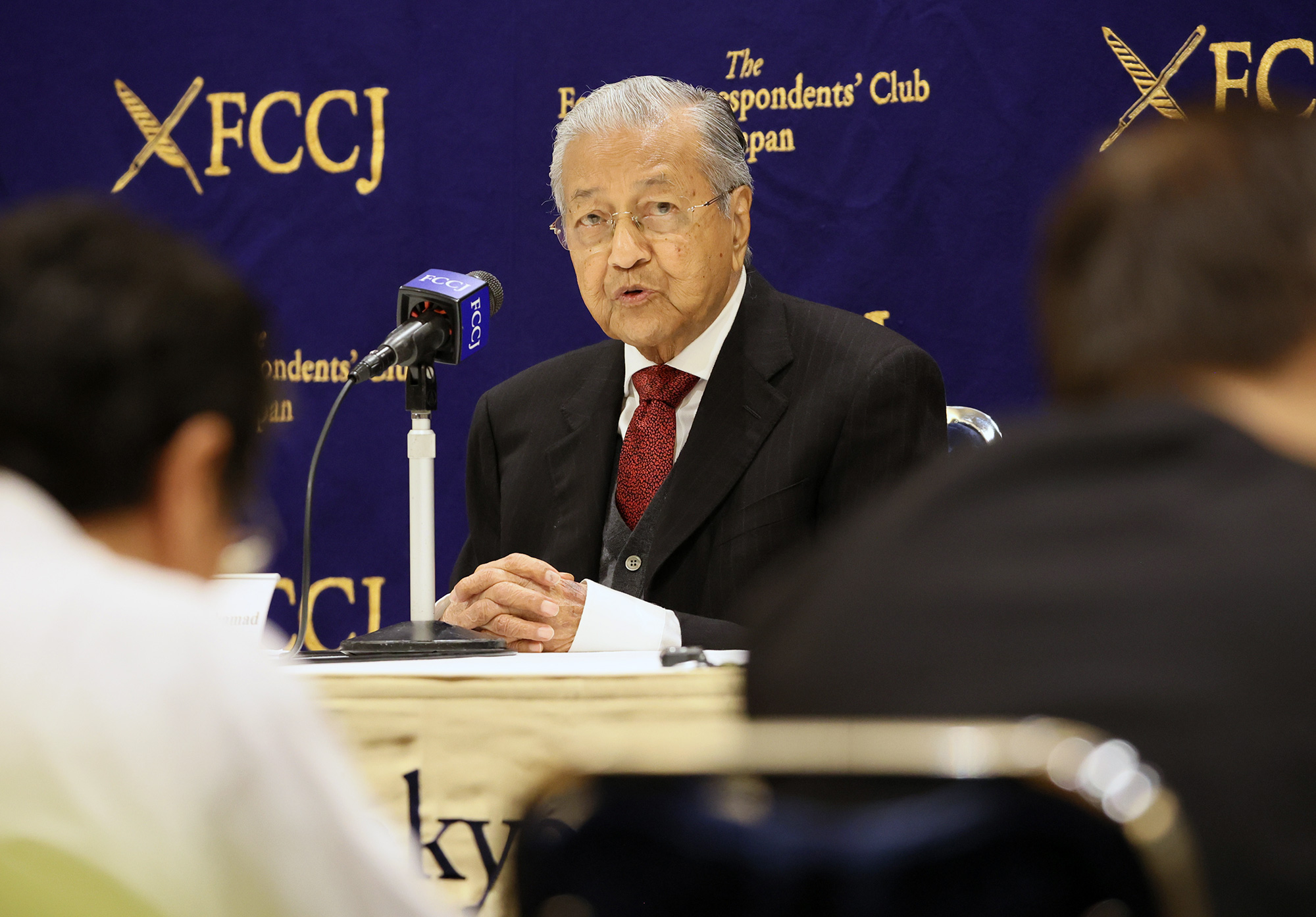Issue:
June 2023
Mahathir Mohamad takes West to task over Russia, China in FCCJ appearance

In his most recent press conference at the FCCJ on May 24, the former Malaysian prime minister, Dr Mahathir bin Mohamad, delivered a strong indictment of what he suggested is the unjustified presumption by Western nations that they are best qualified to run the world.
Despite being 97, he gave little impression of slowing down, offering penetrating intellectual analysis, up-to-date knowledge of global affairs and fluent delivery. All of his faculties were still in place and matched those of a much younger man.
He has also retained his ability to deliver acerbic comments, such as when he suggested that Europeans “like going to war to settle quarrels”, while Southeast Asians generally prefer negotiation, and when he attacked the presumption of certain Western powers in seeking to set global priorities and agendas.
Mahathir, who was in Tokyo to speak at a Nikkei Asia regional conference on Asia, drew quite a large crowd at the FCCJ and attracted many questions from the floor.
Mahathir, Malaysia’s prime minister from 1981 to 2003, and then again from 2018 to 2020, responded to questions with forthrightness, fluency, politeness and political maturity, confirming his reputation as an elder statesman of Asia. They are qualities that stand in stark contrast to the style and actions of many contemporary national leaders.

Mahathir called for a “new model” of government prevent a third world war and, possibly, the destruction of the planet and its people. The global population has now reached 8 billion, but this has not been matched by people’s ability to govern themselves, he said.
Migration is creating multiracial societies that create economic and social strains, but governments have not learned to deal with population growth and diversity, he said. Tribalism, he said, had given rise to nation states and nationalism, but not globalism, in government.
As a result, a handful of major powers has assumed the right to govern globally and is “attempting to politicize all issues” or even to “bring about regime change” in countries that do not agree with their views, he said, adding that those major powers seek to run the world without consultation”.
Mahathir called for a “world government” elected from all countries, as well as a similarly democratic agreement on laws governing international (but not always domestic) aspects of government behaviour.
“We have to work at it, slowly, and learn to act as if we are one country,” he said. “We need a slow merging of nations, in the same way that we went from tribalism to becoming nation states.”
He held up the 10-member Association of Southeast Asian Nations as a model of a group of nations that have successfully cooperated on external affairs and avoided overt conflict and war for many decades.
Mahathir contrasted this with the accelerating drift toward economic or even military confrontation among the world's great powers, and the growing risk that many smaller nations could be dragged into conflicts. “Going to war is not a solution,” he said, adding that the only viable option is sincere and continued negotiation.
There is “powerful pressure now to get the rest of the world to oppose Russia and China,” but this should be resisted, Mahhathir said, before offering an analysis of the factors behind the war in Ukraine and tensions surrounding Taiwan.
After the 1965 Warsaw Pact between the Soviet Union and seven other Eastern Bloc countries was dismantled, the North Atlantic Treaty Organization (NATO) should have been dismantled too, he said. Instead, Western powers led by the United States have sought to get former Warsaw Pact nations to join NATO. This pressure extended to Ukraine, and “Russia responded by attacking Ukraine”, he said.
Asia, by contrast, is “not at war”, he said, adding that Taiwan was formerly "quite friendly” with China until other tensions were stoked.
“We should not allow ourselves to be manipulated by great powers,” he said in tones reminiscent of the 1980s when, as prime minister of Malaysia, he called for the formation of an East Asian Economic Caucus (EAEC) excluding the U.S., only to have Washington (and Japan) reject the proposal.
Since then, various organizations have been formed to include both Asian and Western countries. They were supposed to bring together countries with common interests, but Western powers have used these forums to “take decisions that favour themselves”, Mahathir said.
“A meeting of like-minded countries is like talking to yourself,” he added. “America is telling everyone to please confront China, but if neutral countries such as Malaysia can be friendly with China, why can’t others? We should slowly reduce the enmity we have with other countries.”
Anthony Rowley is a columnist and contributor for the South China Morning Post.

